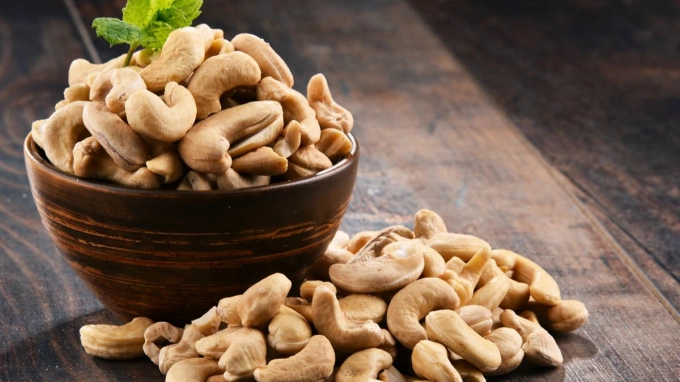November 28, 2025 | 00:03 GMT +7
November 28, 2025 | 00:03 GMT +7
Hotline: 0913.378.918
November 28, 2025 | 00:03 GMT +7
Hotline: 0913.378.918

Cashew nuts are one of Vietnam's agro-products with a large market share in Japan. Photo: TL.
According to Mr. Ta Duc Minh, Vietnam Trade Counselor in Japan, cashew nut is one of Vietnam's agro- products that captured a large market share in the Japanese market (accounting for over 42%).
Japanese importers are increasingly interested in Vietnamese cashew nuts. if you go to the supermarket and look at the area selling processed cashew nuts such as roasted and dried cashew ... you are guaranteed to see Vietnamese cashew nuts.
Many other groups and agricultural products of Vietnam have also claimed a high market share in Japan such as: dried banana which accounted for 78.5%; the lychee, longan, rambutan group accounted for 43%; durian 46.2%; spinach 26%; pepper 25%; cinnamon 17%; coconut accounts for 16.5%; green coffee 14.7%…
Mr. Minh shared, with a population of 126 million people, Japan is a market with great consumption power for imported agricultural, aquatic products and food products. Japan keeps a high import demand for fish, shrimp, meat and meat products, soybeans, cereals, fresh and processed vegetables, coffee,... Many of these commodities are Vietnamese strengths in export.
There are currently about 500,000 Vietnamese people living and working in Japan, so Vietnamese food products are becoming increasingly popular in this market.
According to Ms. Nguyen Thi Thu Thuy, Deputy Director of Export Promotion Center (Trade Promotion Agency), in 2021, the export turnover of Vietnam's agricultural and aquatic products to Japan reached $1.8 billion, decreased slightly by 0.5% compared to 2020.
Although the main merchandise in this group of products is seafood saw a decrease of 7.4%, the remaining items recorded very promising growth, such as coffee up 25.5%, vegetables and fruits up 20%, cashew nuts up 39%, pepper up 56%... Some Vietnamese fruit products also occupy a large market share and are becoming increasingly popular in the market, such as dragon fruit, mango, coconut, lychee…
Currently, a number of Vietnamese products have successfully penetrated into the distribution chain in Japan, including coconut water and coconut milk products… have been imported and distributed by KOME Company to a chain of shops selling Vietnamese products in Tokyo and neighboring provinces; Vietnamese coffee products have been imported and sold at the OK supermarket chain, a popular supermarket chain in Tokyo.
Along with the innovation in consumer tastes, the Japanese are increasingly interested in high-quality products imported from abroad. Vietnam's agricultural, aquatic and food products are appearing with an increase in popularity over a wide variety of products on the shelves of major supermarket chains in Japan, such as AEON, Donkihote, Itoyokado...
Translated by Hoang Duy

(VAN) China’s cooking oil is suddenly flooding into India. It all comes down to a soybean surplus that Beijing doesn’t quite know what to do with.

(VAN) An Giang promotes supply-demand connections, standardizes quality and builds value chains, creating a foundation for sustainable bird’s nest development and aiming to expand exports.
/2025/11/24/5339-4-nongnghiep-075331.jpg)
(VAN) Recently, the conference on 'Sustainable Fisheries Linkage Chain - Tilapia for Export' took place in Tien Hai commune, Hung Yen province.
/2025/11/21/4309-2-153400_128.jpg)
(VAN) Green and low-emission rice is paving the way for Vietnamese rice to enter high-end markets, marking the beginning of a transformation journey toward greening and elevating the national rice brand.

(VAN) ‘Right to Win’ outlines a national action plan that shapes a new vision for Viet Nam’s agriculture in an era of renewal and global integration.

(VAN) Lam Dong’s farmed sturgeon output this year is expected to reach 2,300 tons, worth VND 450 billion, affirming the brand’s position on the market.

(VAN) A surge in Ukrainian egg exports, largely driven by soaring sales to the UK over the last few years, has notably pushed up egg prices on the domestic market.